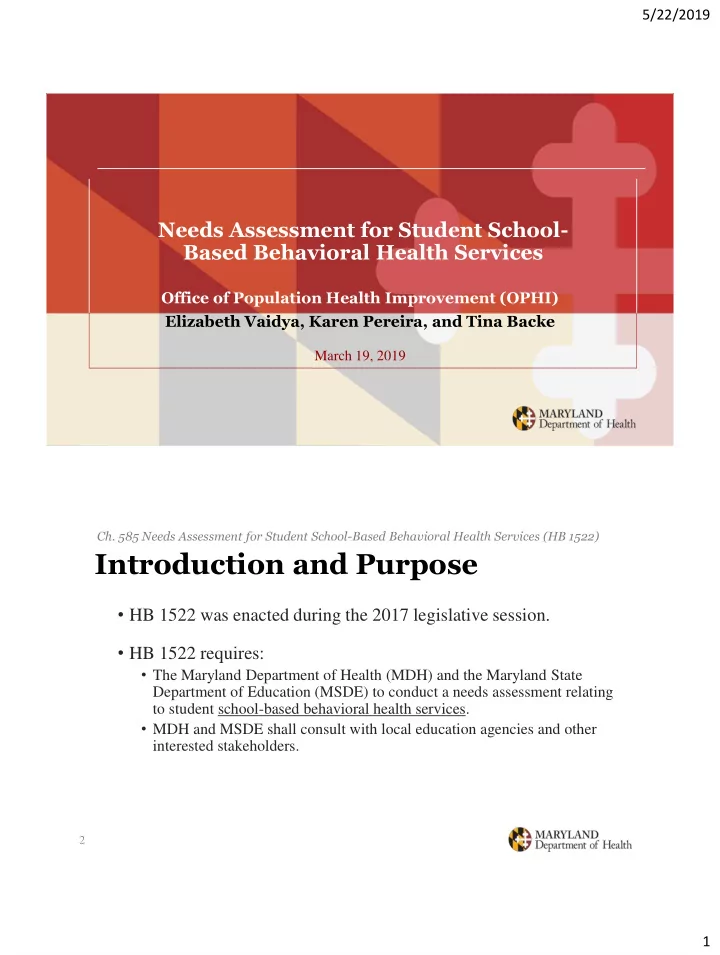

5/22/2019 Needs Assessment for Student School- Based Behavioral Health Services Office of Population Health Improvement (OPHI) Elizabeth Vaidya, Karen Pereira, and Tina Backe March 19, 2019 Ch. 585 Needs Assessment for Student School-Based Behavioral Health Services (HB 1522) Introduction and Purpose • HB 1522 was enacted during the 2017 legislative session. • HB 1522 requires: • The Maryland Department of Health (MDH) and the Maryland State Department of Education (MSDE) to conduct a needs assessment relating to student school-based behavioral health services. • MDH and MSDE shall consult with local education agencies and other interested stakeholders. 2 1
5/22/2019 Data Resources Bill Requirements 1 & 2 1. The needs assessment shall include data concerning all public school jurisdictions in the State; • Child and adolescent psychiatrists, by county • School enrollment- number of schools, type of school, by county 2. The needs assessment shall include an assessment of the need for behavioral health services for each school districts; • Mental Health HPSAs • YRBS Data- Risk factors for school aged children, by county • Medicaid Public Behavioral Health System Services Rendered to School Age Children (Age 5-18)- by jurisdiction • Medicaid Providers Who Served a School Age Child (5-18) & Submitted a Claim for Payment by jurisdiction 3 Data Resources Bill Requirements 3 3. The needs assessment shall include a description of the types of school – based behavioral health services offered to children with behavioral health needs in each school district through community – partnered school – based behavioral health programs. • Sample of Community Partnered School Behavioral Health Programs • Number of Schools Providing CP-SBH Mental Health Services Substance-Use Services, by county • Behavioral and Substance Abuse Programs with Services in Public Schools in Maryland • Primary Referral Concerns for Students Referred by CP-SBH programs • Effectiveness of the behavioral and academic functioning and progress of CP- SBH programs • SHIP Data 4 2
5/22/2019 Data Resources Bill Requirements 4 4. The needs assessment shall include a description of the types of school – based behavioral health services offered to children with behavioral health needs in each school district through school – based health centers. • Number of SBHCs and students enrolled, by county • Location and Names of SBHCs • Counts and Types of services provided by SBHCs, by county • Primary and secondary diagnoses 5 Data Resources Bill Requirements 5 5. The needs assessment shall include documentation of the number of children with behavioral health needs who are being provided services, including the type of services. • Number of students with Mental Health diagnoses, along with top 3 diagnoses, by county • Medicaid Public Behavioral Health System Services Rendered to School Age Children (Age 5-18)- by service type • No data for types and counts of services provided in schools (Questionnaire) 6 3
5/22/2019 Data Resources Bill Requirements 6 & 7 6. Needs assessment shall include a description of the extent to which school – based behavioral health services are offered in the summer and during school breaks, in addition to the school year. • No data • SBHC data- before/after school 7. Needs assessment shall include the obstacles to providing services to all children who need them. • No data • Stakeholder engagement 7 Data Resources Bill Requirements 8 & 9 8. Needs assessment shall include recommendations for removing obstacles to the provision of services to students with behavioral health needs. • To be drafted • Stakeholder engagement 9. In conducting the needs assessment, MDH and MSDE shall consult with local education agencies and other interested stakeholders. • Questionnaire • Data from MSDE was collected from local education agencies 8 4
5/22/2019 Questionnaire Engagement of Stakeholders • What types of school-based behavioral health services are offered in your jurisdiction? • What are the obstacles to providing school-based behavioral health services to students with behavioral health needs? • What are your recommendations to overcoming the obstacles listed above? • Number of public health students (K-12) referred for school-based behavioral health services for the 2016-2017 school year, and 2017-2018 school year? • Number of public health students (K-12) receiving school-based behavioral health services with a behavioral health diagnosis for the 2016-2017 school year, and 2017- 2018 school year? • Number of public health students (K-12) receiving school-based behavioral health services without a behavioral health diagnosis for the 2016-2017 school year, and 2017-2018 school year? 9 Assistance from the Behavioral Health Advisory Council (BHAC) Next Steps • How can the BHAC assist with the distribution of the questionnaire? • Would the BHAC like to answer the questionnaire as council members or have their constituents/stakeholders complete it? • Would the BHAC want OPHI to send out the questionnaire on an electronic, and confidential platform? • Can this be done prior to the new state fiscal year, July 1, 2019? 10 5
5/22/2019 Office of Population Health Improvement Thank You! Elizabeth Vaidya, PCO Director (410) 767-5695 office Elizabeth.vaidya@maryland.gov Karen Pereira, PCO Data Analyst (410) 767-8781 office Karen.pereira@maryland.gov Tina Backe, OPHI Health Policy Analyst (410) 767-5590 office Tina.backe@maryland.gov 11 6
Recommend
More recommend